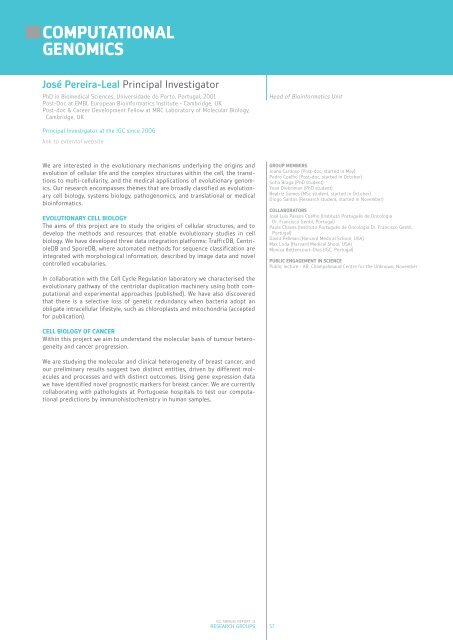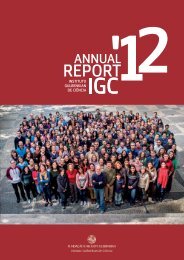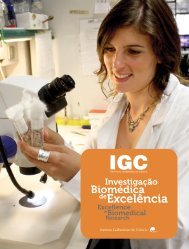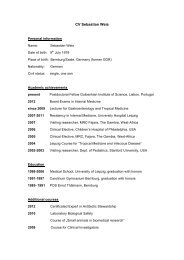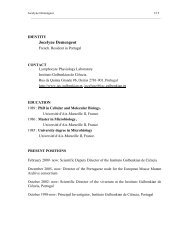organisation - the Instituto Gulbenkian de Ciência
organisation - the Instituto Gulbenkian de Ciência
organisation - the Instituto Gulbenkian de Ciência
- No tags were found...
You also want an ePaper? Increase the reach of your titles
YUMPU automatically turns print PDFs into web optimized ePapers that Google loves.
COMPUTATIONAL<br />
GENOMICS<br />
José Pereira-Leal Principal Investigator<br />
PhD in Biomedical Sciences, Universida<strong>de</strong> do Porto, Portugal, 2001<br />
Post-Doc at EMBL European Bioinformatics Institute - Cambridge, UK<br />
Post-doc & Career Development Fellow at MRC Laboratory of Molecular Biology,<br />
Cambridge, UK<br />
Head of Bioinformatics Unit<br />
Principal Investigator at <strong>the</strong> IGC since 2006<br />
link to external website<br />
We are interested in <strong>the</strong> evolutionary mechanisms un<strong>de</strong>rlying <strong>the</strong> origins and<br />
evolution of cellular life and <strong>the</strong> complex structures within <strong>the</strong> cell, <strong>the</strong> transitions<br />
to multi-cellularity, and <strong>the</strong> medical applications of evolutionary genomics.<br />
Our research encompasses <strong>the</strong>mes that are broadly classified as evolutionary<br />
cell biology, systems biology, pathogenomics, and translational or medical<br />
bioinformatics.<br />
EVOLUTIONARY CELL BIOLOGY<br />
The aims of this project are to study <strong>the</strong> origins of cellular structures, and to<br />
<strong>de</strong>velop <strong>the</strong> methods and resources that enable evolutionary studies in cell<br />
biology. We have <strong>de</strong>veloped three data integration platforms: TrafficDB, CentrioleDB<br />
and SporeDB, where automated methods for sequence classification are<br />
integrated with morphological information, <strong>de</strong>scribed by image data and novel<br />
controlled vocabularies.<br />
GROUP MEMBERS<br />
Joana Cardoso (Post-doc, started in May)<br />
Pedro Coelho (Post-doc, started in October)<br />
Sofia Braga (PhD stu<strong>de</strong>nt)<br />
Yoan Diekmman (PhD stu<strong>de</strong>nt)<br />
Beatriz Gomes (MSc stu<strong>de</strong>nt, started in October)<br />
Diogo Santos (Research stu<strong>de</strong>nt, started in November)<br />
COLLABORATORS<br />
José Luis Passos Coelho (<strong>Instituto</strong> Português <strong>de</strong> Oncologia<br />
Dr. Francisco Gentil, Portugal)<br />
Paula Chaves (<strong>Instituto</strong> Português <strong>de</strong> Oncologia Dr. Francisco Gentil,<br />
Portugal)<br />
David Pellman (Harvard Medical School, USA)<br />
Max Loda (Harvard Medical Shool, USA)<br />
Monica Bettencourt-Dias (IGC, Portugal)<br />
PUBLIC ENGAGEMENT IN SCIENCE<br />
Public lecture - AR, Champalimaud Centre for <strong>the</strong> Unknown, November<br />
In collaboration with <strong>the</strong> Cell Cycle Regulation laboratory we characterised <strong>the</strong><br />
evolutionary pathway of <strong>the</strong> centriolar duplication machinery using both computational<br />
and experimental approaches (published). We have also discovered<br />
that <strong>the</strong>re is a selective loss of genetic redundancy when bacteria adopt an<br />
obligate intracellular lifestyle, such as chloroplasts and mitochondria (accepted<br />
for publication).<br />
CELL BIOLOGY OF CANCER<br />
Within this project we aim to un<strong>de</strong>rstand <strong>the</strong> molecular basis of tumour heterogeneity<br />
and cancer progression.<br />
We are studying <strong>the</strong> molecular and clinical heterogeneity of breast cancer, and<br />
our preliminary results suggest two distinct entities, driven by different molecules<br />
and processes and with distinct outcomes. Using gene expression data<br />
we have i<strong>de</strong>ntified novel prognostic markers for breast cancer. We are currently<br />
collaborating with pathologists at Portuguese hospitals to test our computational<br />
predictions by immunohistochemistry in human samples.<br />
IGC ANNUAL REPORT ‘11<br />
RESEARCH GROUPS<br />
57


